AI in Architecture – Benefits, Use Cases, Examples and Challenges
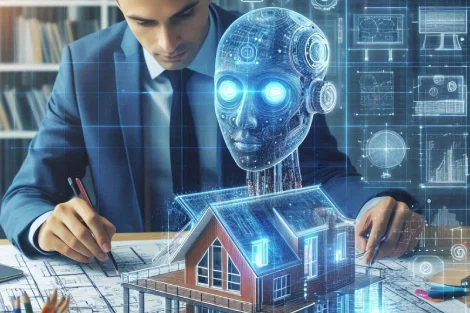
Introduction
Artificial Intelligence is transforming the architecture industry by introducing innovative tools and methodologies that enhance design, improve efficiency, and promote sustainability. AI's ability to analyze vast datasets, predict outcomes, and generate design alternatives is reshaping how architects approach their projects, from initial concept to final construction. This overview explores the key benefits, use cases, examples, and challenges associated with AI in architecture, providing insights into its technological impact on the industry.
Key Benefits of AI in Architecture
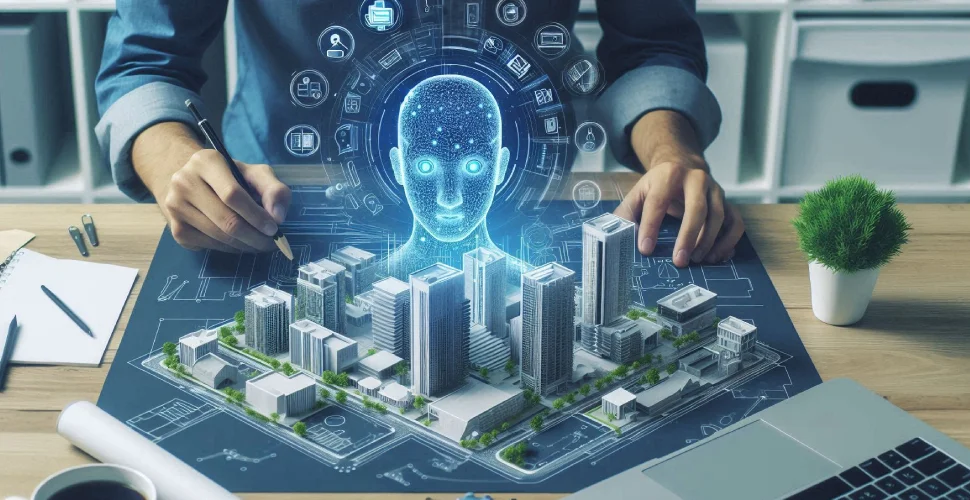
Enhanced Design Efficiency
Embracing AI-powered tools significantly streamlines the design journey for architects. By harnessing the capabilities of AI, architects can swiftly generate an expansive array of innovative design alternatives. This newfound efficiency not only saves valuable time but also conserves resources, enabling architects to explore a broader spectrum of design possibilities than ever before.
Improved Decision-making
At the heart of AI lies its analytical prowess, which empowers architects to navigate through intricate data sets with precision. By leveraging AI-driven insights, architects can make informed decisions with a heightened level of accuracy. This data-driven approach not only optimizes design solutions but also fosters superior project outcomes.
Sustainability and Environmental Performance
AI serves as a catalyst for sustainability in architecture by offering invaluable insights into environmental performance. Through sophisticated algorithms, AI evaluates various design parameters and recommends strategies for enhancing energy efficiency, optimizing material usage, and minimizing environmental impact. This strategic alignment with sustainability goals ensures the creation of buildings that are not only aesthetically pleasing but also environmentally responsible and resilient.
Facilitated Collaboration
In today's interconnected world, collaboration is key to architectural success. AI facilitates seamless collaboration among project stakeholders by providing a centralized platform for data sharing and analysis. By streamlining communication channels and promoting real-time collaboration, AI ensures that all parties involved in the project are on the same page, fostering synergy and coherence throughout the architectural journey.
AI Implementation in Architecture: Key Steps
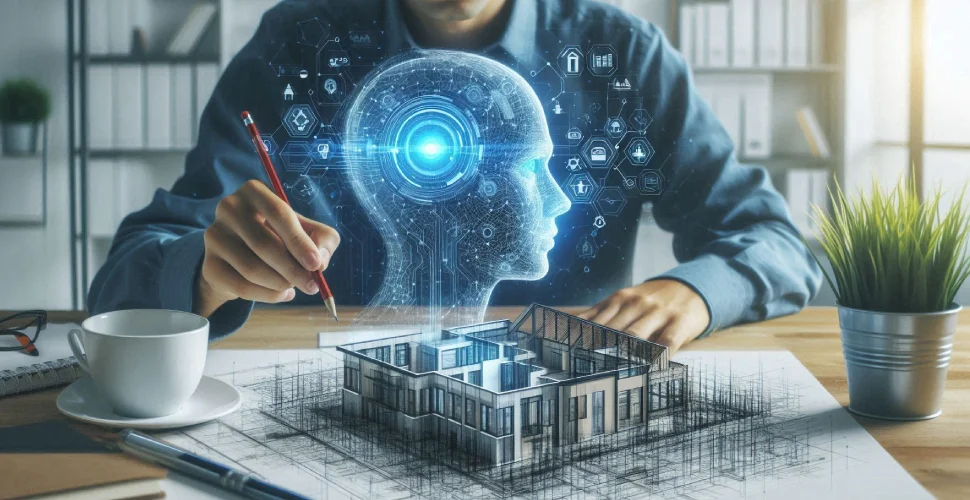
Implementing AI in architecture involves several crucial steps to ensure a smooth transition and successful integration:
- Identifying Objectives and Use Cases: Define clear objectives and specific use cases where AI can provide the most value, such as generative design, energy analysis, or predictive maintenance.
- Data Collection and Preparation: Gather relevant data from various sources, ensuring it is clean, accurate, and well-organized to train AI algorithms effectively.
- Selecting the Right Tools and Technologies: Choose appropriate AI tools and technologies that align with the project's goals and technical requirements.
- Developing and Training Models: Create and train AI models using the collected data, fine-tuning them to ensure accuracy and reliability.
- Integrating AI Solutions: Seamlessly integrate AI solutions into existing workflows and systems, ensuring compatibility and ease of use for all stakeholders.
- Monitoring and Optimization: Continuously monitor the performance of AI systems, making necessary adjustments and optimizations to enhance their effectiveness over time.
Use Cases of Artificial Intelligence in Architecture
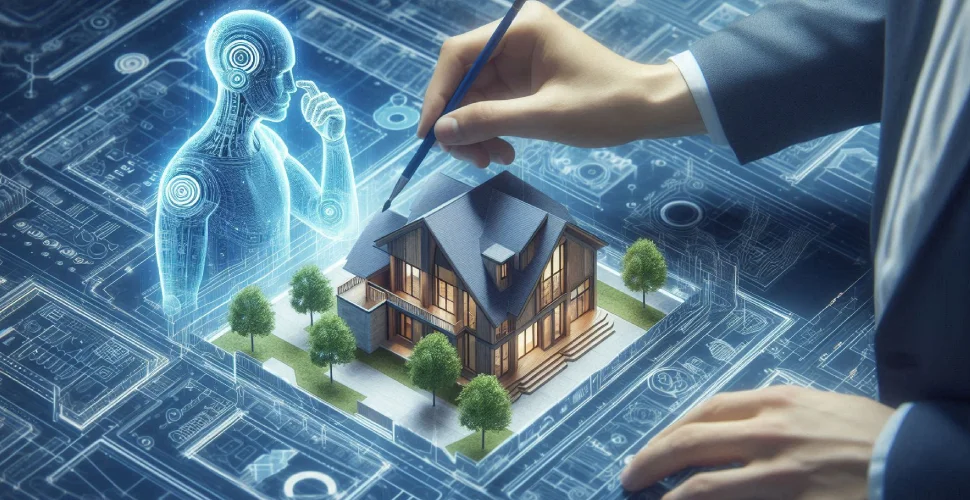
Generative Design
AI-driven generative design enables architects to explore a myriad of design possibilities quickly and efficiently. By inputting specific criteria such as site conditions, functional requirements, and aesthetic preferences, AI algorithms can generate thousands of design alternatives.
These alternatives often go beyond what human designers could conceive in a comparable timeframe. Architects can then evaluate and refine these generated designs, fostering creativity and innovation in the design process. This approach not only accelerates the design exploration phase but also allows architects to discover unconventional solutions that may have otherwise been overlooked.
Energy Analysis
AI-powered simulations play a crucial role in optimizing building energy performance and reducing environmental impact. By analyzing data on building systems, occupancy patterns, and environmental conditions, AI algorithms can assess energy consumption and propose strategies for improving efficiency.
These simulations enable architects to evaluate the performance of different design options and identify opportunities for energy savings. By optimizing building energy performance, architects can minimize operational costs, reduce carbon emissions, and create more sustainable built environments.
Predictive Maintenance
AI-driven predictive maintenance systems offer significant benefits for building management and operations. By monitoring building systems and analyzing data from sensors and IoT devices, AI algorithms can predict equipment failures before they occur.
This proactive approach to maintenance helps prevent costly downtime and disruptions, prolongs equipment lifespan, and reduces maintenance costs. AI-driven predictive maintenance systems enable building managers to prioritize maintenance activities based on the likelihood of failure, optimizing resource allocation and operational efficiency.
Augmented Reality and Virtual Reality
AI-driven AR and VR applications revolutionize the way architects visualize and present their designs. By integrating AI algorithms with AR and VR technologies, architects can create immersive and interactive experiences that bring architectural designs to life. These applications enable clients and stakeholders to experience architectural designs in a realistic and engaging manner, improving communication, collaboration, and decision-making.
Architects can use AI-driven AR and VR tools to explore design options, conduct virtual walkthroughs, and simulate real-world scenarios, enhancing the design process and facilitating client engagement. These technologies have the potential to transform the way architects communicate and present their designs, leading to more informed decisions and better-designed buildings.
Construction Automation
AI-driven robots and drones are transforming the construction industry by automating labour-intensive tasks and improving efficiency and safety on construction sites. These robots and drones can perform a variety of tasks, including site surveying, bricklaying, and quality control, with greater precision and accuracy than traditional methods.
By leveraging AI algorithms, construction companies can optimize construction processes, reduce labour costs, and minimize errors and rework. AI-driven construction automation technologies have the potential to revolutionize the way buildings are constructed, enabling faster project delivery, higher quality, and increased safety.
Examples of Artificial Intelligence in Architecture
Autodesk's Generative Design
Autodesk's software is like a super-smart assistant for architects. It uses AI to come up with thousands of different design ideas, all based on what the architect wants. This helps architects think outside the box and find new, creative solutions for their projects.
Arup's AI in Building Performance
Arup is using AI to make buildings work better. They analyze lots of data about how buildings perform, like how much energy they use and how comfortable they are for the people inside. Then, they use AI to figure out how to design buildings that are more energy-efficient, stronger, and more comfortable for everyone.
IBM Watson's Cognitive Building Management
Imagine if buildings could think for themselves! That's what IBM Watson is helping with. It gives buildings special abilities, like predicting when something might break so it can be fixed before it causes a problem. It also helps buildings use less energy and even make things more comfortable for the people who work or live there.
AI SpaceFactory's MARSHA
Picture a house on Mars, built not by humans, but by robots controlled by AI. That's what AI SpaceFactory is working on with MARSHA. By using AI, they're able to design and build habitats that can withstand the extreme conditions of Mars, opening up new possibilities for exploring and living in space.
AI in Architecture Challenges and Potential Solutions to Consider
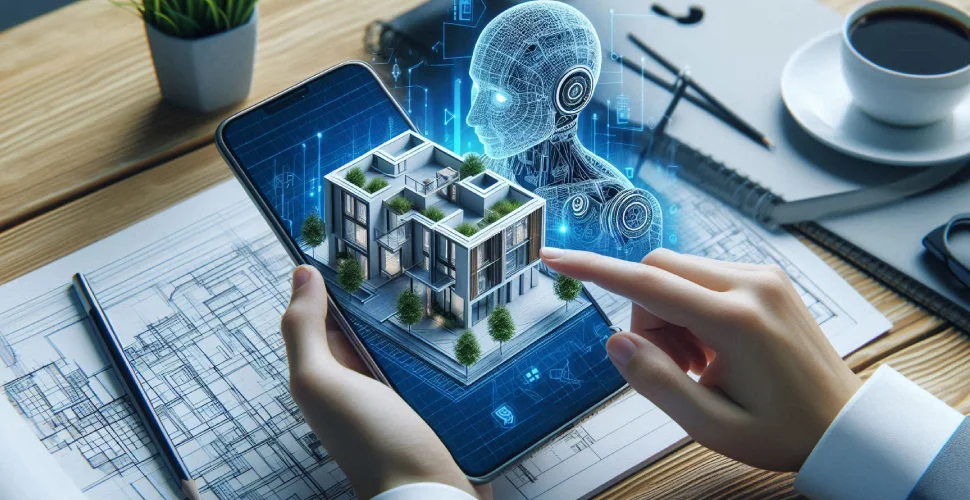
Data Privacy and Security
The integration of AI involves handling vast amounts of data, including sensitive information. Ensuring data privacy and security is paramount. Potential solutions include implementing robust encryption techniques, conducting regular security audits, and adhering to data protection regulations.
High Implementation Costs
The initial investment for AI technologies can be substantial. To mitigate these costs, firms can start with pilot projects, seek funding or grants, and gradually scale up AI adoption based on demonstrated ROI and performance improvements.
Skill Gap
The adoption of AI requires specialized skills that may not be readily available within existing teams. Addressing this challenge involves investing in training programs, collaborating with technology partners, and hiring AI experts to bridge the skill gap.
Integration with Existing Systems
Seamlessly integrating AI with legacy systems can be complex. This challenge can be overcome by using modular AI solutions that are compatible with existing infrastructure and ensuring thorough testing and validation during the integration process.
Ethical Considerations
The use of AI in decision-making raises ethical questions, especially regarding biases in algorithms. Ensuring transparency, conducting regular audits of AI systems, and involving diverse teams in the development process can help mitigate ethical concerns.
Also Read: Generative AI Models: Everything You Need To Know
How Innow8’s Expertise Can Help You In Implementing AI in Your Architectural Project?

Innow8 specializes in helping architectural firms integrate AI technologies into their projects. With a deep understanding of both AI and architecture, Innow8 can guide you through each step of the implementation process:
- Consultation and Strategy Development: Innow8 will work with you to identify your objectives, potential AI use cases, and develop a comprehensive AI strategy tailored to your specific needs.
- Data Management: Innow8 assists in collecting, cleaning, and preparing data to ensure it is ready for AI model training and analysis.
- AI Model Development and Training: Leveraging advanced AI tools and techniques, Innow8 will develop and train models that address your project’s unique challenges and opportunities.
- Integration and Implementation: Innow8 ensures seamless integration of AI solutions into your existing systems and workflows, providing support and training to your team for a smooth transition.
- Ongoing Support and Optimization: Post-implementation, Innow8 offers continuous monitoring, support, and optimization to ensure your AI systems remain effective and up-to-date.
FAQs
What is the role of AI in architecture?
AI in architecture enhances design efficiency, improves decision-making, supports sustainability, facilitates collaboration, and enables innovations such as generative design, energy analysis, predictive maintenance, and construction automation.
How does generative design work in architecture?
Generative design uses AI algorithms to generate multiple design options based on specific criteria such as site conditions and functional requirements. Architects can explore and refine these options, fostering creativity and innovation.
Can AI help in making buildings more energy-efficient?
Yes, AI can analyze data on building systems and environmental conditions to propose strategies for improving energy efficiency, reducing operational costs, and minimizing environmental impact.
What are the challenges of implementing AI in architecture?
Challenges include data privacy and security, high implementation costs, skill gaps, integration with existing systems, and ethical considerations. Solutions involve robust security measures, training programs, modular AI solutions, and ethical oversight.
How can Innow8 assist in AI implementation for architectural projects?
Innow8 offers consultation, data management, AI model development, integration, and ongoing support to ensure successful AI implementation in architectural projects.
Unlock the future of architecture with AI
Recent Blogs:
![Best ways to validate your app Idea [2023 updated]](/_next/static/images/BestWaysToValidateYourAppIdeaIn2021Post-e92e5f172c1b2b6acfa4d6fc51a012bc.jpg)
Best Ways to validate your App idea in 2023
Validate your app idea with these simple 5 ways. Before getting into the development phase y...
Read More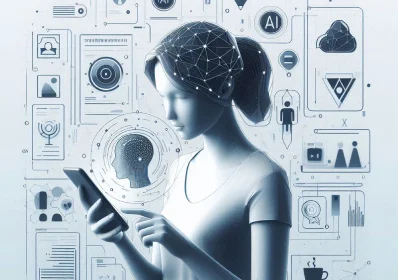
Top 10 Use Cases of Generative AI in Financia...
Discover the top 10 use cases of generative AI in financial services, revolutionizing areas ...
Read More
How much does it cost to develop an app.
Want to know how much it cost to develop an app in 2020? Read on this article to learn the c...
Read More